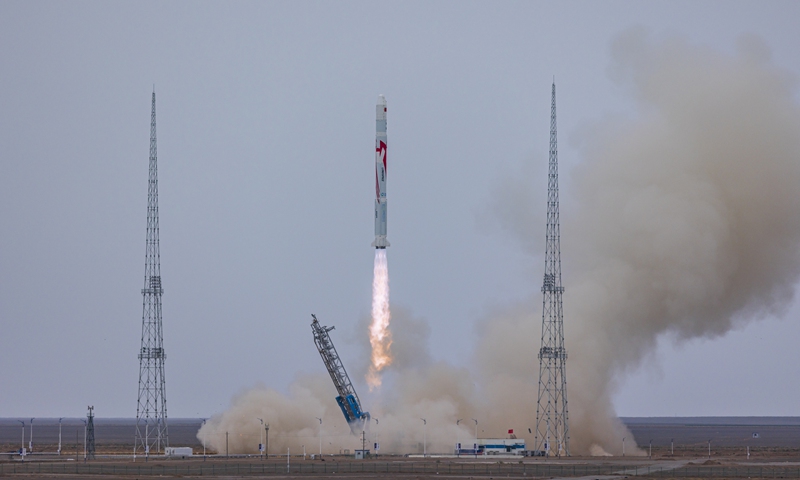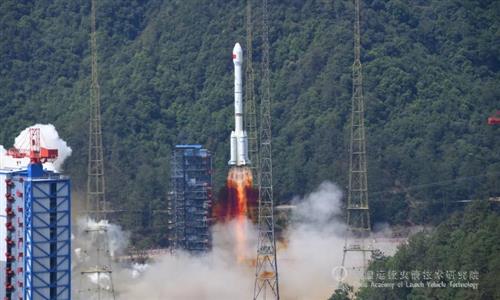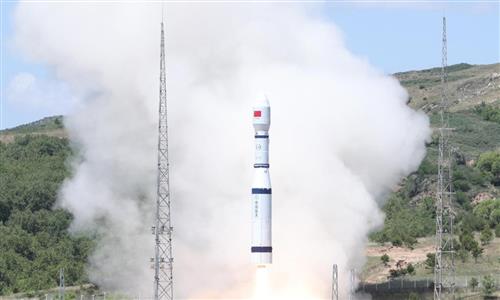World's first liquid oxygen, methane carrier rocket sent into orbit in latest achievement by Chinese private space sector

World's first liquid oxygen, liquid methane carrier rocket ZQ-2 takes off on July 12, 2023. Photo: Courtesy of LandSpace
The world's first liquid oxygen, liquid methane carrier rocket blasted off on Wednesday morning from the Jiuquan Satellite Launch Center in Northwest China's Gansu Province, taking a sample payload into orbit.
Developed by LandSpace, a Chinese privately owned aerospace company, the launch of the ZQ-2 Y2, as it is code-named, marked a breakthrough in the quest to find a new-type low-cost liquid propellant for carrier rockets in China.
The ZQ-2 Y2, the largest and most powerful private rocket in China, completed its flight procedures and accomplished its mission, according to LandSpace. It was the rocket's second flight.
The whole flight took 750 seconds. At 765 seconds, loud applause was heard inside the central control room as the payload successfully entered its designated orbit, the Global Times learned. Rocket scientists were hugging and congratulating each other, and many investors were seen crying with joy.
"Seeing the rocket liftoff on site is quite thrilling, and I plan to put more money into this field," a representative of an investment company told the Global Times on condition of anonymity.
The ZQ-2 rocket is capable of placing a 1.5-ton payload into a typical sun-synchronous orbit at about 500 kilometers above the Earth. Future models could ultimately increase the payload to four tons, according to the company.
The rocket's engine uses a propellant made of liquid oxygen and liquid methane, and it is more environmentally friendly, reducing the required cleaning time from days to hours - a feature vital to much-coveted reusable rocket technology and low-cost launches, according to industry experts.
"The success of the ZQ-2 carrier rocket today has put China in the leading ranks of the global space race for methane-based rockets," Zhang Changwu, founder and CEO of LandSpace, told a press conference following the launch.
Zhang said through upgrades and mass launch capability, it is expected to translate to a 30 percent cost advantage for the ZQ-2 compared with alternatives on the market. "I believe currently, if we can keep the cost of a single rocket under 100 million yuan ($13.91 million), then it is quite competitive," Zhang said.
"Through further optimization, our per kilogram cost will be no higher than that of SpaceX's Falcon 9 rocket," Zhang said, noting that the ZQ-2 Y3 scheduled for launch in the remaining months of 2023 would carry multiple satellites so as to test the ability of the rocket to send payloads into orbit with precision.
The domestically developed ZQ-2 Y2 is a two-stage rocket with a diameter of 3.35 meters and a total length of 49.5 meters. The rocket has a launch weight of 219 tons and takeoff thrust of 268 tons.
It is powered by six liquid-propellant engines, of which five use 80 tons of liquid oxygen and liquid methane as propellant, making them the largest in Asia.
The successful test flight validated the systems of the ZQ-2, and laid a solid foundation for the next-stage research and development of reusable rockets, the company said.
The successful test has brought the start-up's official commercial rocket launch plan closer to fruition. The company said the ZQ-2 will soon start mass launch programs, and it will continue to upgrade its products and services centered around the ZQ-2 carrier rocket, with the aim of providing a low-cost, high-performance and heavy-duty carrier rocket solution.
The company is preparing for a third launch of the ZQ-2, Zhang Changwu said.
Wednesday's launch was the second for the ZQ-2. In December 2022, the rocket failed its maiden test flight when an abnormality occurred in the second stage of the rocket.
"If we can obtain success of the ZQ-2 model within the year, we will start to deliver a small number for the market from 2024, like three or four launches, and double the number in the year after… if we maintain this growth pace, I think we will be the first private rocket company in the country to 'achieve one from zero'," Zhang said.
Based on the "one" that has materialized, the CEO said it will act like "a shot in the arm" for the firm to accelerate R&D on other projects. For example, LandSpace is kicking off a reusable rocket project. "Our plan is to achieve launch in 2025."
The Chinese government has been encouraging private capital to take part in the aerospace sector. LandSpace, one of the pioneers, is sometimes compared to US-based SpaceX.
China's domestic commercial space sector is in an era of rapid development, and the threshold remains high for a private rocket company, as it is demanding to create a comprehensive self-developed value chain from design, manufacturing and testing to the final launch, industry observers said.
In April, SpaceX's Starship, which is propelled by a liquid oxygen, liquid methane-fueled engine, exploded during its first attempted orbital test flight after nearly four minutes of launch.
The whole R&D of the ZQ-2 took the company five years and cost nearly 600 million yuan, according to the company.





